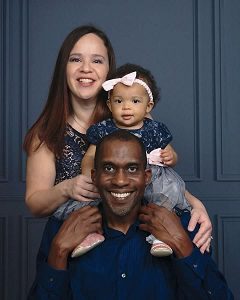Emilia Marrero-Greene, M Ed, MT(AAB), MLT(ASCP)
 |
| Author Emilia Marrero-Greene with her daughter and husband. |
The recent deaths of George Floyd, Breonna Taylor, and Rayshard Brooks at the hands of police gave rise to important conversations in our nation. The ASCLS Board of Directors and the Diversity Advocacy Council pledge to focus on discrimination and disparities that people of color face in the United States. As a medical laboratory scientist for more than 10 years, and as a member of the Latinx community, and mother to a biracial/black child, I feel I would be remiss if I did not share my story, as well as my hopes for the future of our profession.
ASCLS, and certainly our profession as a whole, has a unique opportunity to be a voice for the voiceless. Martin Luther King Jr. once said, “Injustice anywhere is a threat to justice everywhere.” While our profession is certainly an example of diversity and inclusivity, there are still many opportunities for improvement. These opportunities go beyond merely speaking out against police brutality. ASCLS continues to commit to addressing the inequalities people of color face within healthcare, as well as provide education to its members to ensure we provide equitable and quality care. While these are important first steps, I believe there is more we can do to demonstrate that, to our profession, black lives matter.
At the memorial service for George Floyd, Reverend Al Sharpton said, “What happened to Floyd happens every day in this country, in education, in health services, and in every area of American life. It’s time for us to stand up in George’s name and say, get your knee off our necks.” Black and brown people do not want or need favors. We want the same opportunities that our white male counterparts receive. I have no desire to revisit this same, tired conversation of inequity in 10 or 20 years, as my own daughter begins her journey in America. I want her to enjoy the bounties of equal access to opportunity that are often taken for granted by her white counterparts. So how can we laboratorians begin to ensure fairness and equality among our kind?
“As our Society moves to end systemic racism, we must also pledge to listen to each other, speak up for each other, and encourage our members to be vocal in their own experiences.”
Healthcare workers are a diverse group. In my career as a scientist, I have worked with and learned from white Americans, black Americans, the breadth of the Latinx community, people from throughout the Caribbean, and Asia. Our laboratories are a cultural mosaic, and our field presents many opportunities for people of color and other global citizens.
Despite our impressive diversity, there are areas in which we can improve. While you may see people of color in supervisory and management positions within the laboratory, they often earn less than their white male counterparts. Studies completed by the U.S. Census Bureau and the U.S. Department of Education provide concrete data to these disparities. In healthcare, women are paid 71 cents for every dollar men earn, regardless of their education level. Across all professions, black men employed full-time tend to earn 76 cents for every dollar that white men earn. For every dollar that white men earn, black and Latina women earn 61 and 53 cents, respectively. While salaries among mid-level management are not generally discussed, I can confidently disclose that I, too, am a victim of wage disparity. As a laboratory supervisor, I was paid less than a white male counterpart who had the same level of education, yet less laboratory experience.
I implore ASCLS to use our legislative voice to help facilitate substantial change in our profession. Our Society should support policies that prevent employers from retaliating against employees who discuss wages and make it easier to demonstrate when discrimination has occurred. We should advocate for healthcare companies to provide more transparency in their hiring practices. We should also seek to prohibit these same companies from screening job applicants based on salary history. The COVID-19 pandemic continues to show the public what we laboratorians already know—laboratory workers are vital members of society and whose work saves lives.
Finally, while my story might mirror the stories of so many others in our field, many voices continue to go unheard. As a white-skinned, New York-born Puerto-Rican woman, my experience in America and in this profession will be vastly different than the experiences of the white women, the Haitian men, and the Filipino students that I work among. As our Society moves to end systemic racism, we must also pledge to listen to each other, speak up for each other, and encourage our members to be vocal in their own experiences. We’ve pledged to care for our patients. Let’s continue our pledge to care for each other.
Emilia Marrero-Greene is MLT/MLS Program Faculty at Keiser University in Orlando, Florida.
